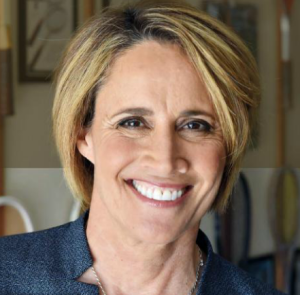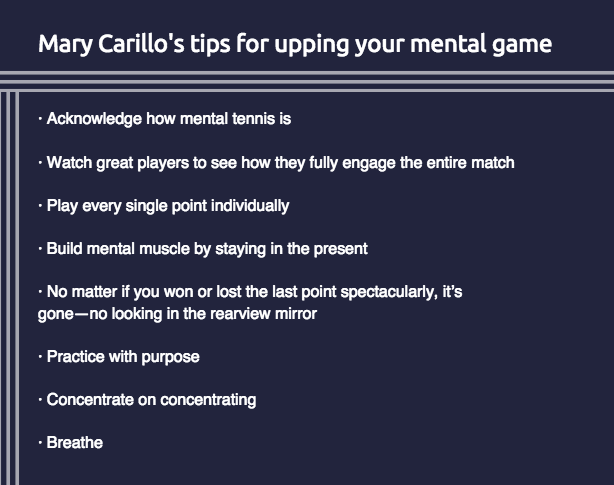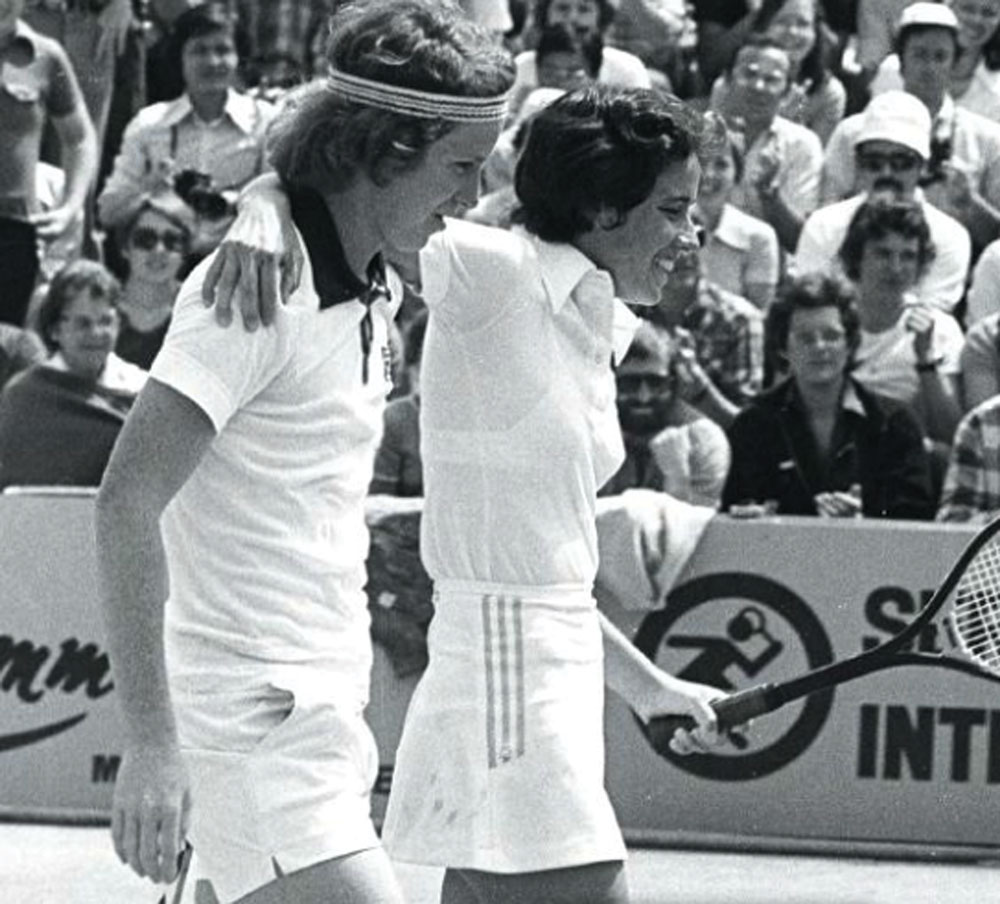The famed Grand Slam winner and lauded sports analyst, Mary Carillo, sits down with our own Kathy Feinstein to talk tennis, athletic fortitude, and which of today’s best players have a winning mental edge.
 I began my chat with Mary Carillo feeling pretty starstruck. The feeling was justified—not only is she a world-renowned tennis player who won the French Open mixed doubles title with John McEnroe in 1977, but she’s also an award-winning sports reporter, having covered Grand Slam tennis for NBC Sports as an analyst, as well as several Olympic Games. Over the course of her sensational career, she’s earned a Peabody Award, a Sports Emmy Award for her exceptional coverage, been named Best Commentator by World Tennis Magazine, and twice named Best Broadcaster by the Women’s Tennis Association. That’s a pretty impressive résumé.
I began my chat with Mary Carillo feeling pretty starstruck. The feeling was justified—not only is she a world-renowned tennis player who won the French Open mixed doubles title with John McEnroe in 1977, but she’s also an award-winning sports reporter, having covered Grand Slam tennis for NBC Sports as an analyst, as well as several Olympic Games. Over the course of her sensational career, she’s earned a Peabody Award, a Sports Emmy Award for her exceptional coverage, been named Best Commentator by World Tennis Magazine, and twice named Best Broadcaster by the Women’s Tennis Association. That’s a pretty impressive résumé.
Despite her many achievements, by the end of our conversation, I felt humbled by her great humility and so proud to learn we share a passion: the athlete’s heart.
Carillo outlined the importance of crafting good technique in today’s tennis, since “top players win a rally on the first strike … today, power rules.” She herself feels a sense of awe at the athleticism of players who can chase down power shots to keep the rally going, and describes this athleticism as stunning and beautiful: “As you can see, I’m very high on my own sport,” she laughs.
As for her own strategy when she herself was a professional player, her troublesome knees required her to play a very mental game, which, as a sports therapist, I loved hearing. She talked with great admiration about her coach, mentor, and friend, the legendary Billie Jean King, who Carillo credits for honing her mental game. One of the key elements she learned from King was the credo, “It’s not failure; it’s feedback.” We agreed that this is the foundation of a growth mindset and a champion’s attitude. In fact, King was ahead of her time in encouraging Carillo to stay in the moment, visualize her success, and use rituals for focus. She also taught Carillo that [Tweet ““pressure is a privilege,””] and to embrace it.
There was one memorable match in particular in which she felt she “choked.” Afterwards, in the debrief, King redefined the choking for her as “a sign you care.” This positive reframe made all the difference for her going forward, and led to her avid avowal that she would rather choke than tank a match. To tank a match is to stop trying, and in her opinion, that is the worst thing in the world a player can do.
“I may have had a mediocre career,” she declares with her signature wry humor, “but I never tanked a match!”
Regarding today’s power players and which ones on the tour particularly demonstrate that mental toughness—or athlete’s heart—that we both respect so much, she makes the distinction between mental toughness and emotional control, and gives her one-of-a-kind analysis of some of the world’s finest tennis champions.
On Andy Murray:
“There’s a difference between [being] mental and emotional. Some players can be very fit physically and mentally, but someone like Andy Murray, for instance, who is a terrific player … he’s already won Wimbledon and the US Open and Olympic gold but when he falters … he gets frustrated and aggravated with himself and his emotions cause him to go away mentally. You see it. It’s his single biggest flaw. You watch it and think ‘why is this guy imploding?’ He has an incredible skill set and he’s supremely fit, and yet he has a tendency to allow one point to become much more than one point. One bad point to him can become an entire game or an entire set. And [when that happens], now he’s allowed the mental advantage to go to the other side of the net.”
On Rafael Nadal:
“Rafa Nadal, the Spaniard who’s won nine of the last 10 French Opens, hasn’t won a clay court tournament this year, and that is remarkable. He’s had a lot of injuries [so] he missed a lot of last season, and when he talks about his failures this season, he doesn’t talk about the fact that he missed a lot time with a bad wrist, appendicitis, and his ongoing knee problems. [Instead], he said ‘mentally, I’m not prepared.’ This is the guy who was the mentally strongest player in the world for years and you definitely did not want to face that brainpan [across the court], especially on clay.
“He is, in fact, a little too honest, too candid about his failures, because he’s letting the guys in the locker room know he’s not the same guy that he’s been for the last decade. He can’t help it, because he is so honest, [but] he doesn’t want people to think that his deficiencies are physical … that they’re [instead] mental.”
On Maria Sharapova:
“One of the mentally strongest players in women’s tennis. She openly admits that she does not have friends on the tour; no friends in the locker room. She never makes small talk. She is her own island, and I have big respect for that because she is such a thoroughgoing professional and she knows what’s best for her. She doesn’t want to engage, she doesn’t want to be distracted. You know, sometimes you walk into the locker room and there are players crying: they’ve just lost a match or gotten bad news that they’ve broken up with somebody. She doesn’t want to spend any energy on that.”
On Serena Williams:
“People who in the big moments play bold tennis [like Serena Williams]—I revel in watching and talking about that. Serena Williams has been dominating this sport for so long, and there have been times when she has not been at her physical peak, she has been out of shape, she’s been injured, she has sometimes lost her confidence. And [yet] the will of that woman to come up good in the direst circumstances, under all kinds of pressure [is amazing]. She’s always expected to win, so any loss even against a great player is considered a bad loss … I mean can you imagine living like that? Like every time you lose, it makes news. When you win, it’s not that big of a deal. [But] when you lose, you’ve just made someone world famous.”
“An awful lot of sport psychologists spend an awful lot of time working with tennis players these days, [and] it’s a big, big part of the game. There are all kinds of men and women who can play professional tennis at a world-class level, [but] what separates them is mental toughness: their acuity, their flexibility, their willingness to adapt. If a match doesn’t go the way they thought it would go … you can train for a match and think you have a game plan, and all of a sudden your opponent is doing things you didn’t expect because they are trying capture what they think they know about your style. Then, you have to be smart enough and willing enough to change tactics, to change your mind about how this match can get won.
Related: Overcome Sports Performance Anxiety
“The greatest thing in the world for me [to see] is a hard-fought match and somebody is down and you can almost see … them sitting down during the changeover, [thinking] ‘what do I have to do to win the match, what do I have to change?’ It’s really cool to watch all that problem solving.”
Finally, Carillo had some valuable advice for our readers who are also avid tennis players. Use these tips to help strengthen your mental game, and take her final words of wisdom to heart the next time you step onto the court, whether it’s to practice or to compete:
“Athletes have a remarkable facility to reset: You have to get back up, and [professional] athletes have to do [this] publicly, with their country’s flag on their back … they’ve got guts. [And] to be able to train that set of [mental] muscles? There’s nothing like it for me.”

Looking for other mental toughness tips? Read On…

